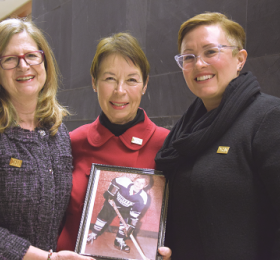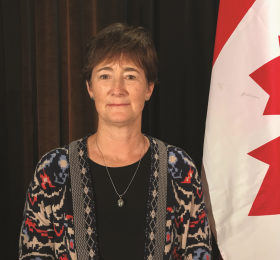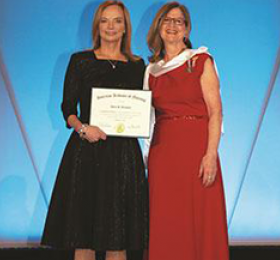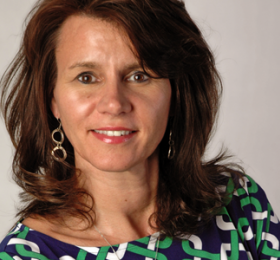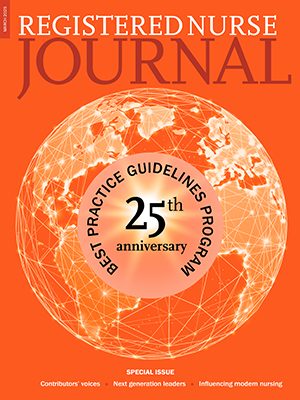Bill 34 seeks to repeal green energy measures
RNAO’s Region 6 board representative Hilda Swirsky and senior economist Kim Jarvi appeared before a legislative committee Oct. 30 to offer recommendations on Bill 34, also known as the Green Energy Repeal Act.
The legislation will make it tougher for renewable energy projects to get approved. It also removes a provision that commits the province to meet its targets to reduce greenhouse gas emissions. The legislation has received royal assent.
To read more, visit RNAO.ca/Bill34submission
CIHI report finds Ontario spends less than other provinces on health
A recent report by the Canadian Institute for Health Information (CIHI) provides some revealing data when it comes to health spending. Ontario spends less on health, on a per capita basis, than other provinces across the country.
National Health Expenditure Trends, 1975 to 2018 was released on Nov. 20. It finds Ontario ranks last in provincial per capita health spending at $4,064 per person. That’s significantly lower than the rest of the country, where the figure averages $4,594 per person.
CIHI data also show that health-care cuts in Ontario are hitting the hospital sector especially hard. Over the last four decades, hospital spending dropped from 44 per cent of total health spending to 27 per cent. The result is that Ontario is the second-lowest per capita spender on hospitals, beating out only Quebec. Ontario sits well below the national average of $1,933 per person.
RNAO says the funding crunch has led hospitals to avoid filling 10,000 vacant RN positions, and to replace RNs with less qualified health providers. CEO Doris Grinspun says this data should serve as a wake-up call for Queen’s Park, which claims previous governments had a “spending problem.”
The evidence conclusively shows higher proportions of RN care are associated with lower mortality rates, fewer compli-cations, fewer hospital readmissions and greater patient satisfaction, Grinspun adds.
For more information, visit RNAO.ca/CIHIreport2018
Coroner’s inquest focuses on homelessness and addiction
Issues such as homelessness and addiction took centre stage at a coroner’s inquest that began at the end of November. The proceedings focused on the circumstances into the death of Brad Chapman, a 43-year-old father of three who died on Aug. 26, 2015 in downtown Toronto.
RNAO was a party to the inquest, which meant representatives from the association could ask questions of witnesses and make submissions. At the time of Chapman’s death, there were no sites offering access to supervised injection services (SIS) or overdose prevention services (OPS). Now, there are 18 sites operating across the province, with an additional three sites preparing to open. RNAO says such services are essential given opioids claimed the lives of 867 people in 2016, and 1,265 people in 2017.
Testimony during the inquest demonstrated huge cracks across multiple systems that failed Chapman, and didn’t adequately respond to repeated requests for help to find housing and support to treat his addiction.
For the latest on the outcome of the inquest, visit announcements and updates at RNAO.ca
RNAO member receives Oncology Nurse of the Year award
This October, Robin Morash was honoured with an Oncology Nurse of the Year award from the Canadian Association of Nurses in Oncology (CANO). Morash, who retired in June, says that receiving the award from her peers was a lovely way to finish her 35-year career. “It was very humbling. I was floored when I was nominated, and even more so when I won,” she says. “The timing couldn’t have been better.”
Morash began her career in Toronto General Hospital’s surgical oncology department in 1983. Cancer care at that time was often more about making terminal patients more comfortable, she explains. “In those days, cancer wasn’t a chronic disease. People died,” she says. “Back in the 80s, we treated the disease. You treat the whole person now.”
Morash found herself working in other nursing roles throughout her career, including advanced practice nursing, but found her way back to oncology, and specifically supporting patients dealing with bladder cancer. “When patients were diagnosed…I was the first nurse they met with to provide them with education and support,” Morash explains of her most recent role.
She isn’t sure what’s next, but Morash says she wants to continue volunteering with Bladder Cancer Canada. She also currently co-chairs a CANO special interest group on survivorship.
RNAO immediate past president joins CNO
Toronto Public Health Chief Nurse Carol Timmings, who was RNAO’s president from 2016 to 2018, will continue to help shape nursing practice in the province in her new role as the director of practice and quality at the College of Nurses of Ontario (CNO). The prominent nurse leader says she is exhilarated by the prospects of this next chapter of her career.
Timmings says she is looking forward to learning more about professional regulation and the college mandate of supporting quality practice within its primary goal of public safety and protection.
Timmings has been an active RNAO member for more than 20 years. She’s held several positions on the association’s board of directors, including member-at-large, administration, prior to becoming president-elect in 2015 and president in 2016. She has held a number of other advisory board positions with organizations such as Health Quality Ontario, the National Collaborating Centre for Determinants of Health, and the Ontario Public Health Association, as well as sharing her knowledge on expert panels for Ontario’s ministry of health.
Timmings says she cherishes the time she’s dedicated to being an RNAO board member. “RNAO has been a career highlight for me,” she says. Her advice as a nursing leader: get involved in your profession, engage on issues you care about, and have an impact on both nursing and health. “RNAO is a collective force, and the real heart of the organization is every RN, NP and nursing student in the province.”
CEO inducted into American Academy of Nursing
In November, RNAO CEO Doris Grinspun (right) was inducted as an honourary academy fellow of the American Academy of Nursing. Her induction was based on how her nursing career has influenced nursing practice, health policies and health care overall. Grinspun attended the formal induction ceremony in Washington, D.C. and is pictured with Academy President Karen Cox. “It was a humbling experience being recognized as one of 2,500 nurse leaders worldwide,” Grinspun says. “At the time of the induction, I had in my mind and heart those who have influenced my life, especially my family, my RNAO family, and friends. Without them, this high recognition would have no meaning.”
NPs advocate for medical marijuana
Following the legalization of recreational cannabis in October, more Canadians may be looking to experiment with it for its medicinal benefits. NP Morgan Toombs, CEO of O Cannabis, Canada’s only NP-led medical cannabis clinic, says it has already helped nearly 10,000 Canadians with their cannabis needs (e.g. how to use it safely and effectively). Toombs says her clients prefer a “natural” medicine, and are seeking medication that can work without side effects. “The feedback that we’ve been getting is just extraordinary,” Toombs says. “This is really why we all do the work that we do. People are getting better with medical cannabis and it’s so rewarding to hear their stories.” Toombs says NPs are filling a gap created by this new treatment option, and are serving the patients who want to try it. “Patients who have tried everything, and they’ve had a really hard time finding the right medicine … will have often approached their doctors and are not able to get access,” Toombs says. Physicians may sometimes feel uncomfortable prescribing medical cannabis, she says, so patients come to a clinic like hers to get more information and care. (CTV News, Nov. 17)
Nurse becomes regional VP
A long-time RNAO member and former emergency department RN is now leading cancer services and medical research in Ontario’s north. On Dec. 10, Maureen McLelland began her duties as regional vice-president for Cancer Care Ontario’s North East Regional Cancer Program at Health Sciences North (HSN). She also began her duties as hospital vice-president and chief operating officer for its research institute. In her role for Cancer Care Ontario, McLelland oversees the quality and delivery of cancer services for the residents of Algoma, Cochrane, Manitoulin-Sudbury, and other northern cities. She also leads a clinical portfolio of more than 700 employees. McLelland says it is a “privilege to work collaboratively with regional partners to further the goals in the Regional Cancer Plan and Ontario Cancer Plan, and to champion…efforts (at HSN) to be more socially accountable and grow our research impact.” (Sudbury Star, Nov. 3)
People living with diabetes celebrated for courage
In early November, as many as 250 people gathered in Norfolk to mark the 25th anniversary of the diabetes program at Norfolk General Hospital. “You have arrived and survived, and most importantly, you have thrived in spite of it all,” Cindy Gekiere, diabetes program co-ordinator across Haldimand and Norfolk counties, told attendees during the celebration. Gekiere added she is humbled by the courage and strength of those living with diabetes, and their commitment to lifestyle changes to help control blood sugar. Many people living with diabetes today monitor their blood-sugar levels with a wrist watch-like device. Not long ago, patients monitored their blood sugar with a blood test, notes Gekiere. There are four registered nurses, three registered dieticians, and two clerks who care for 5,500 clients on the program’s database. In addition to care, the program offers its Sugar Scoop newsletter, which provides subscribers with up-to-date information about diabetes management. (Simcoe Reformer, Nov. 20)
Lessons in human trafficking
It is vital for parents and children to communicate with one another in order to stop human trafficking, says Huron County Health Unit RN Johanna Calamusa. The public health nurse was participating in a human trafficking awareness presentation at Exeter’s South Huron District High School in October when she told attendees that “(children) will talk if you listen.” It’s the parents’ job to be educated about human trafficking, she adds. The event, hosted by the health unit in collaboration with other organizations, including Victim Services Huron County, was created to teach parents and students about human trafficking, who is vulnerable, and how to identify signs that someone may be victimized. Calamusa encourages families to have meals together every day as a way to connect and build structure in the family. Parents should also teach their children what healthy relationships look like, she notes. (The Mitchell Advocate, Oct. 25

